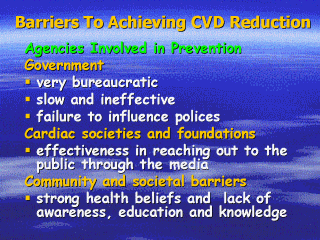| front |1 |2 |3 |4 |5 |6 |7 |8 |9 |10 |11 |12 |13 |14 |15 |16 |17 |18 |19 |20 |21 |22 |23 |24 |25 |26 |27 |28 |29 |30 |31 |32 |33 |34 |35 |36 |37 |review |
 |
In industrialized
countries, societies and foundations such as the World Heart Federation (WHF)
and WHO have been most active. Observance of World Heart Day, World Health
Day and World Non-Smoking Day has increased awareness and the seeking of
medical help. In Pakistan, the concept of a World Heart Day is slowly
gaining acceptance at nation wide level. Similarly, American Heart Association (AHA)/American College of Cardiology (ACC), National Heart, Lung and Blood Institute, British Heart Foundation, Heart Foundation of Australia and New Zealand, the European Society of Cardiology and the European Heart Network have been very effective in reaching out to the public through the media. However, governments are usually very bureaucratic, slow and ineffective. To give an example, for the past several years the Pakistan cardiac society have been knocking at the doors of the Government of Pakistan for a hearing and a policy statement on heart disease. Governments, especially in the developing countries, can do a lot by way of legislation against the use of tobacco for e.g. and for labeling of processed foods to declare their fat and sodium content. The government must have the political will to eradicate the disease by proper transfer of technology to the states. The Government of Pakistan has failed to provide an impetus to eradicate RHD as it mostly affects the poor. The fundamental contribution of lifestyle behaviors to the prevention and reduction of risk factors, and the high prevalence of risk factors in most population groups, mandate a public health approach to preventing CVD. In countries are Pakistan, communities carry very strong beliefs food rich in fat. E.g saturated fat is better than oil etc. The influence of myths on patient behavior and the effect of dispelling myths are important areas for study. The emphasis in medical school and training is on diagnosing and treating acute illness. Physicians receive very little education in public prevention and the management of chronic conditions. Cardiologists, in particular, often view their role as managing the acute event; they frequently defer long-term prevention issues to primary care providers. the lack of specialist attention reinforces the perception on the part of primary care providers and patients that the treatment of chronic risk factors and lifestyle modification are discretionary practices. |